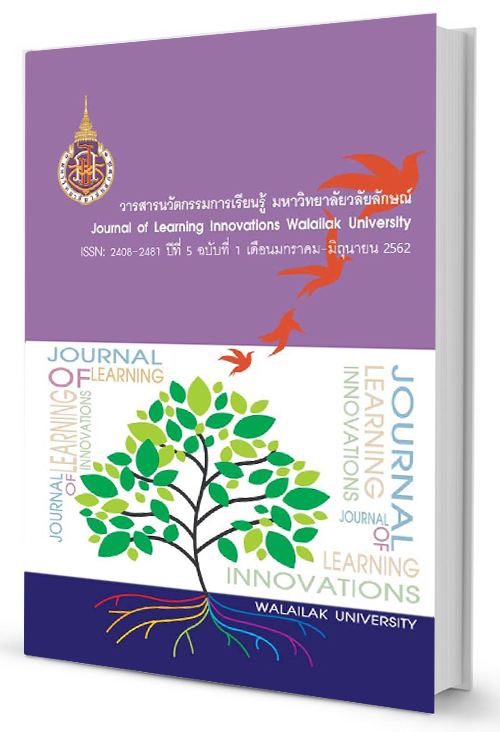การโต้แย้งทางวิทยาศาสตร์ของนักเรียนชั้นมัธยมศึกษาปีที่ 5 ที่เรียนรู้ด้วยการสืบเสาะแบบมีการโต้แย้งในปฏิบัติการรายวิชาเคมี
DOI:
https://doi.org/10.14456/jli.2019.2คำสำคัญ:
การโต้แย้งทางวิทยาศาสตร์, ปฏิบัติการเคมี, การเรียนรู้แบบสืบเสาะบทคัดย่อ
การโต้แย้งทางวิทยาศาสตร์เป็นความสามารถในการสร้าง คัดค้าน และพัฒนาข้อกล่าวอ้าง โดยใช้หลักฐานและเหตุผลมาสนับสนุน ซึ่งเป็นวิธีการที่นำไปสู่การสร้างองค์ความรู้ที่ได้รับการยอมรับ เพื่อช่วยให้นักเรียนได้เรียนรู้การโต้แย้งทางวิทยาศาสตร์ในปฏิบัติการทดลองของรายวิชาเคมี ครูจำเป็นต้องใช้สถานการณ์คำถามเพื่อนำไปสู่ประเด็นการโต้แย้งนักเรียนควรได้รับโอกาสในสามารถลงมือทำการทดลองเพื่อค้นหาคำตอบของคำถามและสร้างข้อกล่าวอ้างของตนที่สนับสนุนด้วยหลักฐานเชิงประจักษ์ นอกจากนี้การสื่อสารระหว่างกลุ่มของนักเรียนที่มีแนวคิดที่ต่างกันจะนำไปสู่การลงข้อสรุปที่ถูกต้องร่วมกัน งานวิจัยนี้มีวัตถุประสงค์เพื่อศึกษาการโต้แย้งทางวิทยาศาสตร์ในปฏิบัติการรายวิชาเคมีของนักเรียนที่เรียนรู้ด้วยการจัดการเรียนรู้สืบเสาะแบบมีการโต้แย้ง กลุ่มที่ศึกษาเป็นนักเรียนชั้นมัธยมศึกษาปีที่ 5 จำนวน 31 คน กำลังศึกษาที่โรงเรียนแห่งหนึ่งในจังหวัดขอนแก่น แบบทดสอบการโต้แย้งทางวิทยาศาสตร์นำมาใช้เป็นแหล่งข้อมูลหลักในการประเมินทั้งก่อนและหลังเรียน ผลการวิจัยพบว่านักเรียนส่วนใหญ่พัฒนาระดับการโต้แย้งทางวิทยาศาสตร์ได้ดีขึ้นจากระดับพอใช้เป็นระดับดีมาก มากไปกว่านั้นนักเรียนสามารถพัฒนาทุกองค์ประกอบการโต้แย้ง ได้แก่ ข้อกล่าวอ้าง หลักฐาน ข้อกล่าวอ้างที่ต่างออกไป และเหตุผลสนับสนุนการโต้แย้ง สรุปได้ว่าการจัดการเรียนรู้สืบเสาะแบบมีการโต้แย้งในปฏิบัติการเคมีเป็นรูปแบบการจัดการเรียนรู้หนึ่งที่สามารถการพัฒนาการโต้แย้งทางวิทยาศาสตร์ของนักเรียนได้
References
Bybee, R. (2008). Scientific literacy, environmental issues, and PISA 2006: The 2008 Paul F-Brandwein lecture. Journal of Science Education and Technology, 17(6), 566-585.
Cavagnetto, A. (2010). Argument to foster scientific literacy: A review of argument interventions in K-12 science contexts. Review of Educational Research, 80(3), 336-371.
Chaimongkol, P., Chanunan, S., & Klamtet, J. (2017). Kānphatthanā khwāmsāmāt nai kānhai hētphon chœ̄ng witthayāsāt rư̄ang parimān sān samphan dōi kānčhatkān rīanrū dūai rūpbǣp kān sư̄pso̜ thī khapkhlư̄an dūai konlawithī kān tōyǣng [Development of scientific reasoning ability in stoichiometry unit using argument-driven inquiry instructional model]. Journal of Research Unit on Science, Technology and Environment for Learning, 8(1), 27-40.
Chen, H. T., Wang, H. H., Lu, Y. Y., & Hong, Z. R. (2016). Using a modified argument-driven inquiry to promote elementary school students’ engagement in learning science and argumentation. International Journal of Science Education, 38(2), 170-191.
Chinn. C., & Malhotra, B., (2002). Epistemologically authentic inquiry in school: A theoretical framework for evaluating inquiry tasks. Science Education, 86(2), 175-218
Dawson, G. J. (2010). The impact of a classroom intervention on grade 10 students’ argumentation skills, informal reasoning, and conceptual understanding of science. Journal of Research in Science Teaching, 47(8), 952-977.
Dukerich, L. (2015). Applying modeling instruction to high school chemistry to improve students’ conceptual understanding. Journal of Chemical Education, 92(8), 1315-1319.
Erduran, S., Ozdem, Y., & Park, Y. G. (2015). Research trends on argumentation in science education: A journal content analysis from 1998-2014. International Journal of STEM Education, 2(1), 1-12.
Issara, P., & Chuchat, A. (2015). Phonkānchai rūpbǣp kān rīan kānsō̜n sư̄p sō̜p bǣp mī kān tōyǣng rūam kap theknik kān rīanrū bǣp rūammư̄ thīm phīlō̜ tō̜ phon samrit thāngkān rīan khēmī læ khwāmsāmāt nai kānhai hētphon chœ̄ng witthayāsāt khō̜ng nakrīan matthayommasưksā tō̜n plāi rōngrīan witthayāsāt phūmiphāk [Effects of using an argument-driven inquiry instructional model with cooperative learning techniques on chemistry learning achievement and scientific reasoning abilities of upper secondary school students in the regional science schools]. An Online Journal of Education, 10(2) 249-260.
Jantarakantee, E. (2016). Kānčhatkān rīan kānsō̜n phư̄a songsœ̄m thaksa kān tōyǣng nai chan rīan witthayāsāt [Instruction for promoting argumentation skill in science classroom]. Journal of Yala Rajabhat University, 11(1), 217-232.
Kulatunga, U., Moog, R., & Lewis, J. (2013). Argumentation and participation patterns in general chemistry peer-led sessions. Journal of Research In Science Teaching, 50(10), 1207-1231.
Lee, M. H., Wu, Y. T., & Tsai, C. C. (2009). Research trends in science education from 2003 to 2007: A content analysis of publications in selected journals. International Journal of Science Education, 31(15), 1999-2020.
Lin, S. S., & Mintzes, J. (2010). Learning argumentation skills through instruction in socioscientific issues: The effect of ability level. International Journal of Science and Mathematics Education, 8(6), 993-1017.
Sampson, V., & Walker, J. (2013). Argument-driven inquiry as a way to help undergraduate chemistry students learn how to construct arguments and engage in argumentation during a laboratory course. Journal of Research in Science Teaching, 50(5), 561-596.
Suppe, F. (1998). The structure of a scientific paper. Philosophy of Science, 65(3), 381-405.
Tuba, D., & Sedat, U. (2015). Investigating the effect of argument-driven inquiry in laboratory instruction. Educational Sciences: Theory & Practice, 15(1), 267-283.
Walker, J., Sampson, V., & Zimmerman, C. (2011). Argument-driven inquiry: An introduction to a new instructional model for use in undergraduate chemistry labs. Chemistry Education Research and Practice, 88(8), 1048-1056.
Downloads
เผยแพร่แล้ว
How to Cite
ฉบับ
บท
License
เนื้อหาและข้อมูลในบทความที่ลงตีพิมพ์ในวารสารนวัตกรรมการเรียนรู้ มหาวิทยาลัยวลัยลักษณ์ ถือเป็นข้อคิดเห็นและความรับผิดชอบของผู้เขียนบทความโดยตรง ซึ่งกองบรรณาธิการวารสาร ไม่จำเป็นต้องเห็นด้วย หรือร่วมรับผิดชอบใดๆ
บทความ ข้อมูล เนื้อหา รูปภาพ ฯลฯ ที่ได้รับการตีพิมพ์ในวารสารนวัตกรรมการเรียนรู้ มหาวิทยาลัยวลัยลักษณ์ ถือเป็นลิขสิทธิ์ของวารสารนวัตกรรมการเรียนรุ้ มหาวิทยาลัยวลัยลักษณ์ หากบุคคลหรือหน่วยงานใดต้องการนำทั้งหมดหรือส่วนหนึ่งส่วนใดไปเผยแพร่ต่อเพื่อกระทำการใดๆ จ้อต้องได้รับอนุญาตเป็นลายลักษณ์อักษรจากวารสารนวัตกรรมการเรียนรู้ มหาวิทยาลัยวลัยลักษณ์ก่อนเท่านั้น

